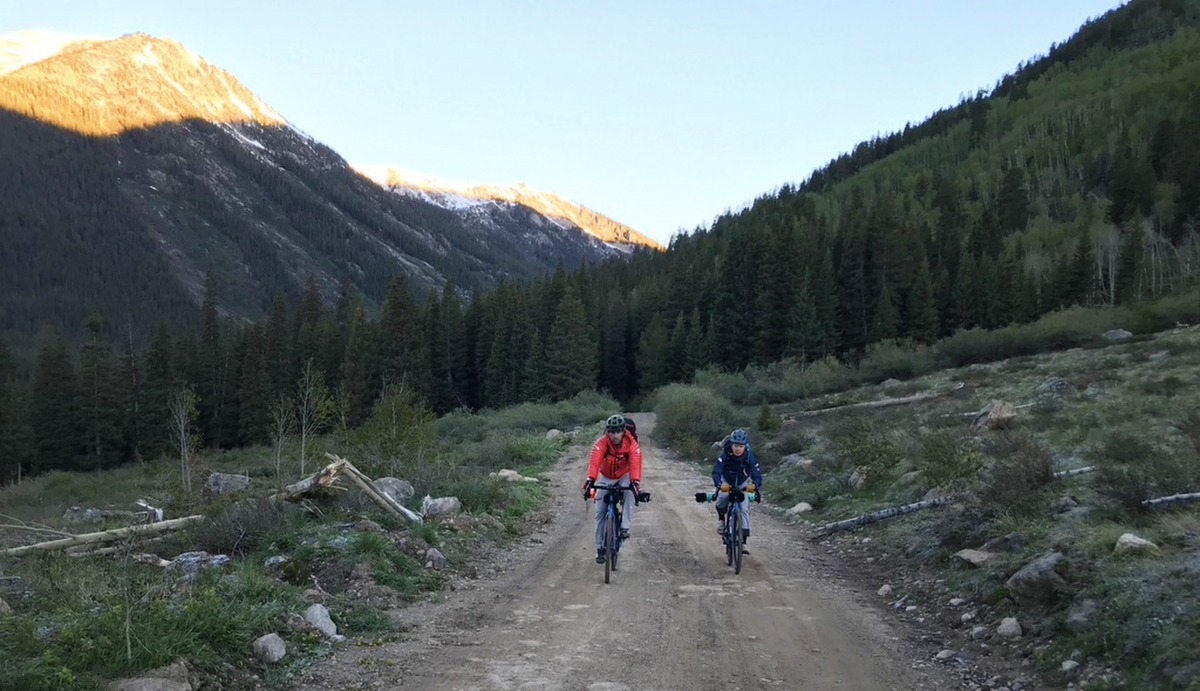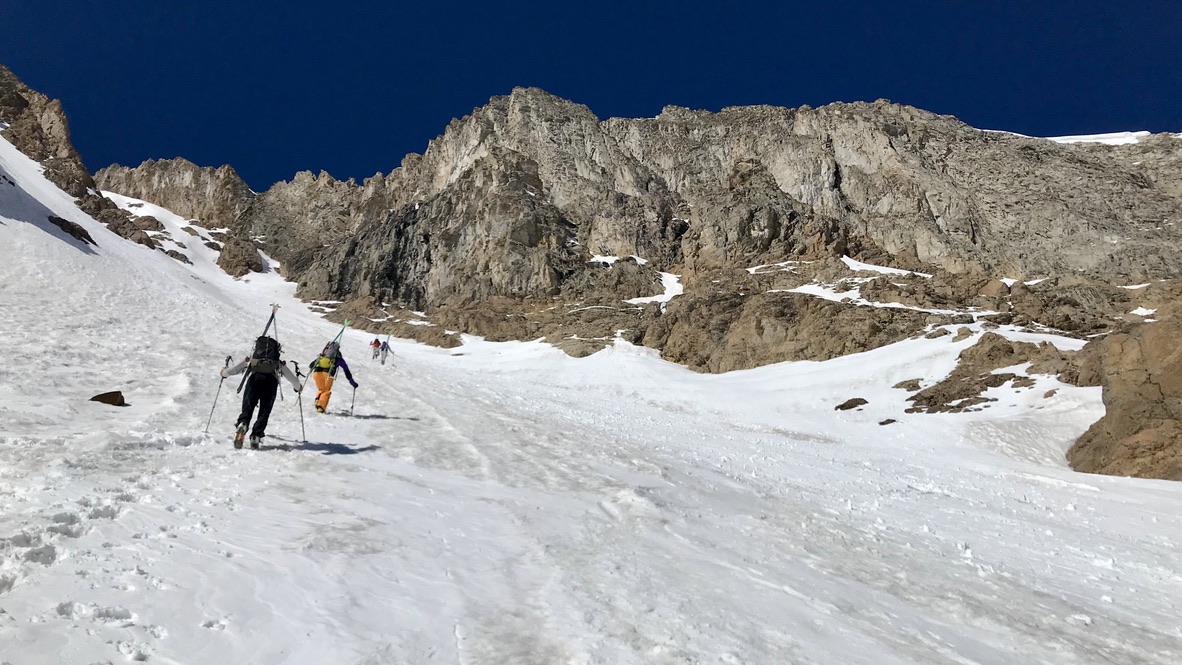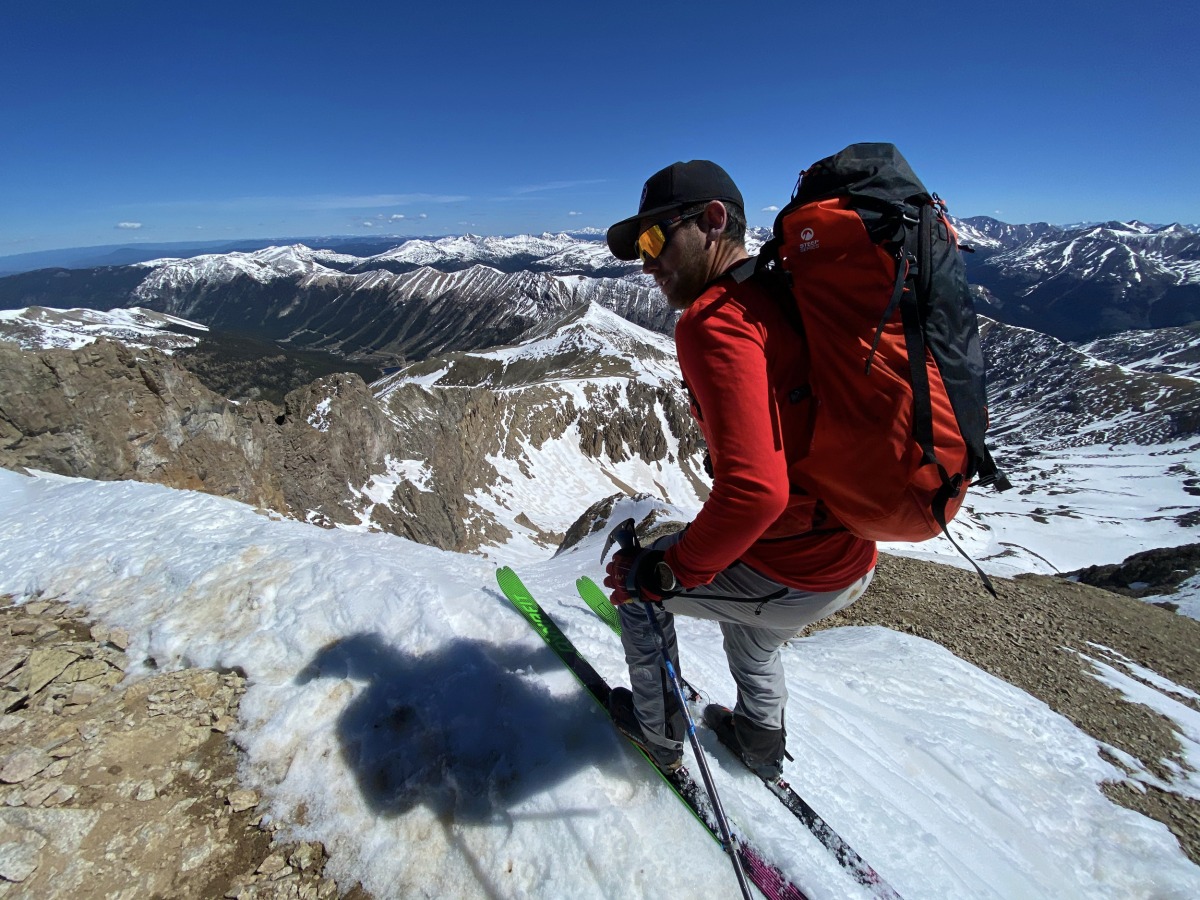When the alarm rang at 4:30 a.m. on an early summer morning last week, I wasn’t ready to greet the day. Fortunately in the summer in the mountains, the plethora of literal early birds don’t really give you a choice. There was a shrill chorus of them singing outside the van walls and it wasn’t even light outside.
Of course, I had more reason to wake than the bird calls — Doug, our friend Hugh and I were aiming to ski Grizzly Peak, a mountain outside of Aspen with which I had a bone to pick. Last summer I’d attempted to bike to ski it and failed. This year, every ounce of me was determined to succeed.
Located in the Sawatch mountains east of Aspen, 13,988 foot Grizzly Peak is a popular spring and summer ski. Once the forest service road that leads to it opens for the season, the approach is relatively short, and the peak’s crown line, Grizzly Couloir offers a beautiful 2000 foot descent that ranges from 35 to 40 degrees and even brushes 50 at the top. The due north facing aspect holds snow well into summer. And, if you really want to turn the day to multisport, you can do what we were planning: bike the 6-miles of chundery Forest Service road to the trailhead.
Over a decade had passed since I first skied off Grizzly’s summit. Back then, my crew and I had bumped down to the end of the road in an old Toyota truck and camped before embarking on our early morning. I’d only been back one other time, last summer, when I attempted to bike to ski and failed miserably. The failure wasn’t from fitness but for lack of gear forethought: wide DPS skis, old Scarpa F1s, an ancient 40L Mammut climbing pack, a 28 pound full suspension mountain bike, and skis arranged A-frame style on my back instead of on the bike. 2000 feet below the summit, I threw in the towel. My fatigue showed in a pace too slow to keep up with the others and I was worried about the steep bootpack warming up in the hot summer sun. This year I was determined to ski from that summit once again, but doing so meant overhauling the gear choices.
The gear
The overhaul started with the bike. While I love a squishy full suspension rig, I often feel they’re a little excessive for certain kinds of riding, including many of the mountain forest service roads that lead into the mountains nearby. So I’ve been curious lately about more minimal rigs that are lighter and more efficient but can still handle rough conditions.
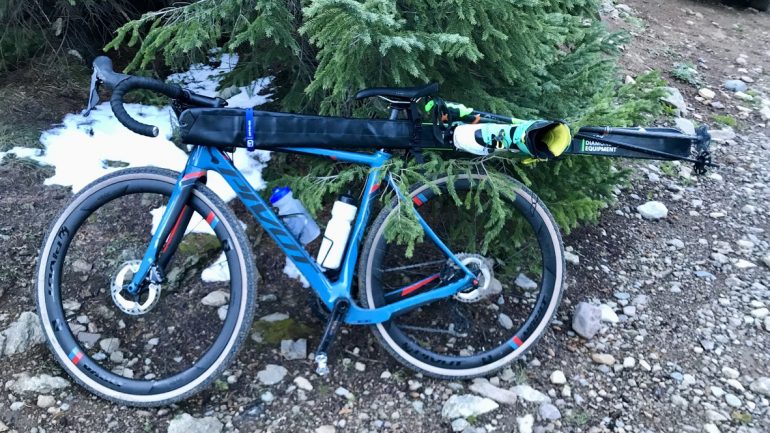
he rig. I didn’t weigh it properly but according to my hand scale it felt close to the weight of my mountain bike without gear.
On my list of bikes to try was the Pivot Vault, a drop bar rig with a stiff carbon frame that fits up to 45cx700 tires or high volume 650bs and is designed for speed and agility on all kinds of road surfaces. Pivot also developed what they call Iso Flex technology which helps to dampen bumpy rides by isolating the seat post from the frame. Oh, and it weighs in at 18 pounds. The weight alone was a selling point, but I really wanted to see how the increased efficiency could lead to a more pleasant, successful endeavor.
Now for skis. Last year’s DPS skis had been a fine choice, but I’ve also been curious this season to experiment with the capabilities of skinnier skis. The Black Diamond Cirque 78 fit the bill. New for next year, the cirque skis offer a light, nimble full sidewall skinny ski ideal for spring/summer couloir skiing. (Full review to come). They paired well with the 145 gram Black Diamond Helio bindings and sub 1000 gram La Sportiva Sytrons. I traded the very useful but heavy Mammut climbing pack for the North Face Rapidus 30, a lightweight race-oriented ski sack.
The last major upgrade was my bike/ski system. Last year I’d used the ol’ standby A-frame, and let’s just say it made the ride really fricken hard. First off, it kept all of the weight on my back, which is never ideal (or efficient) when you’re sitting on a bike. Second, the skis (with boots attached) caused the pack to flop around each time I got out of my saddle to charge up any number of the steep abrupt hills that the rocky approach road offered. This constantly jerked me off balance and forced me to expend unnecessary energy bracing myself. Third, the A-frame just doesn’t look as cool and streamlined as skis mounted on the bike. So, I needed to be efficient, comfortable and look cool. I needed a different carry system.
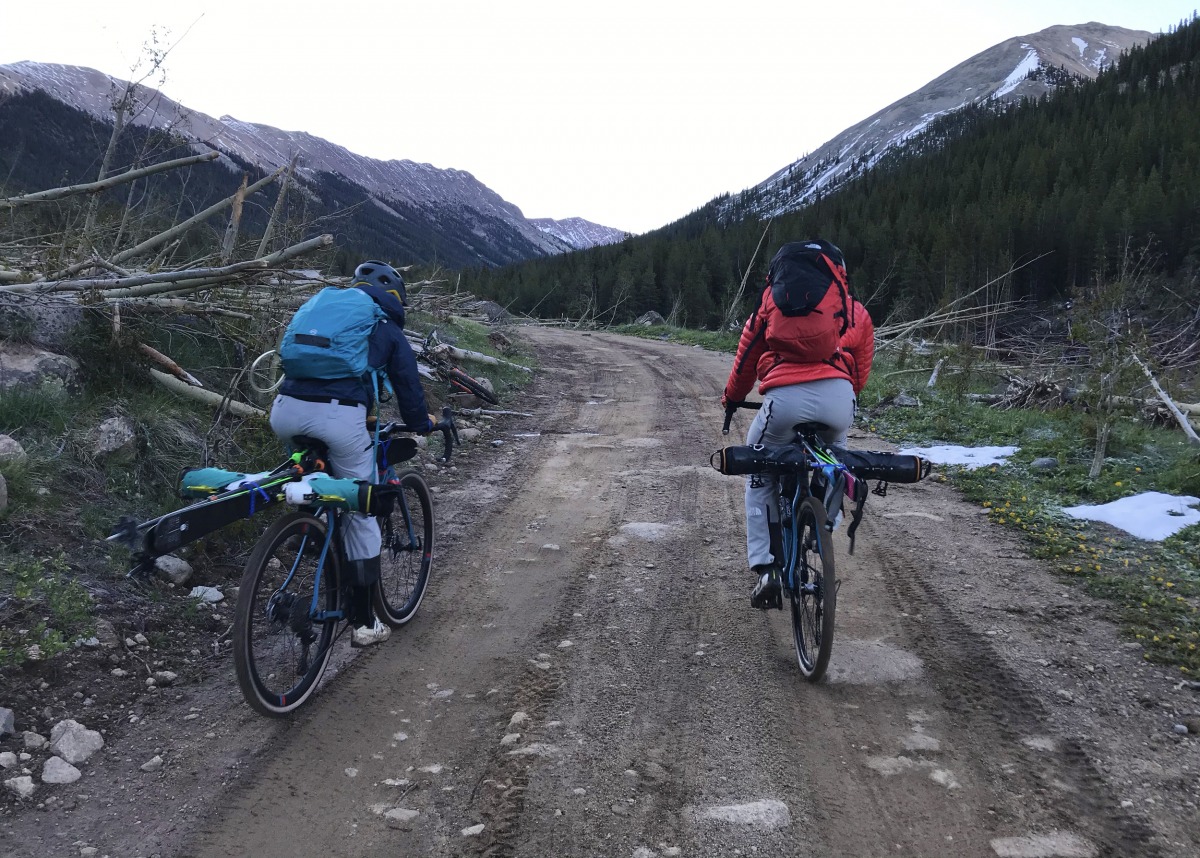
A mellow stretch of the road which varied from steeper rock crawly sections to relatively smooth dirt. Photo: @hughcarey406
I got my hands on some Defiant Pack Gunslingers, ideal for carrying the skis on the bike without hurting the frame. The gunslinger is essentially a harness you mount on the toptube/stem and the seat post. You then slide the skis into the velcro sleeves on either side of the bike that run parallel to the top tube. The velcro sleeves protect the frame from sharp ski edges and keep things tightly in place. Click your ski boots into the bindings, throw some ski straps on to keep your poles in place (or in this case, one whippet and one pole) and you’re ready to go.
Or, we were ready to go. It was time for redemption.
The ski
We started riding a short time after dawn lit the sky and the mountains turned dusky morning blue. A gentle freeze had settled in the valley at 9500 feet the night before, hinting at stable spring conditions up high. The road climb felt easy on the Pivot, its 700x40mm tires rolled smoothly and the stiff frame climbed efficiently over the gravelly, at times chunky road. I noticed an immediate difference in how easy it was to get out of the saddle to pedal compared to my skis on the back carry method the year before. And the skis, snug in their gunslinger cases didn’t move an inch. It was going to be a good day.
After a pleasant 6 miles and 1000 vertical feet of climbing over an hour of pedaling, we reached the trailhead. Sunlight was starting to touch the high peaks around us. I swapped my SPD bike shoes for ski boots, while the guys kept their sneakers and bike shoes on. Last summer the trail had had patchy snow from the start but this year there was no snow in sight. This carried on for the next 2.5 miles up the valley until we hit softening snow around 11,800 feet and started skinning.
A June storm had blown through a few days before, depositing enough snow to fill in the sun cups that often deter skiers this time of year. We spotted two different parties climbing ahead of us. The sun was now flooding the shallow valley head and already going to work on heating up the peaks. At the base of the couloir, we quickly cramponed up and started booting.
The snow was weird — a patchy old sun-baked layer on the bottom topped by the new snow that was chalky in some places but then creamy and crusted in others. It got consistently crustier as we climbed higher, with the old layer proving a little slick. Contrary to last year, I chugged along with the others without too much thought to the effort of the task. We reached the summit at 9:45 a.m., ahead of our projected time and were greeted by a crew of local folks.
Given the crusty top layer that had gotten colder and icier as we’d climbed higher, we weren’t in a hurry. Snacks, photos and views offered a pleasant way to pass the time. I remembered back to my first time skiing the peak 10 years before. Back then I was a proud tele skier, but I was also a spooked tele skier when dropping in on the 50 degree roll off the top.
This year, the drop in felt much smoother. The Cirque 78s seemed to execute turns like they were reading my mind and they blew through variable patches with surprising stability for their narrow waists and feathery disposition.
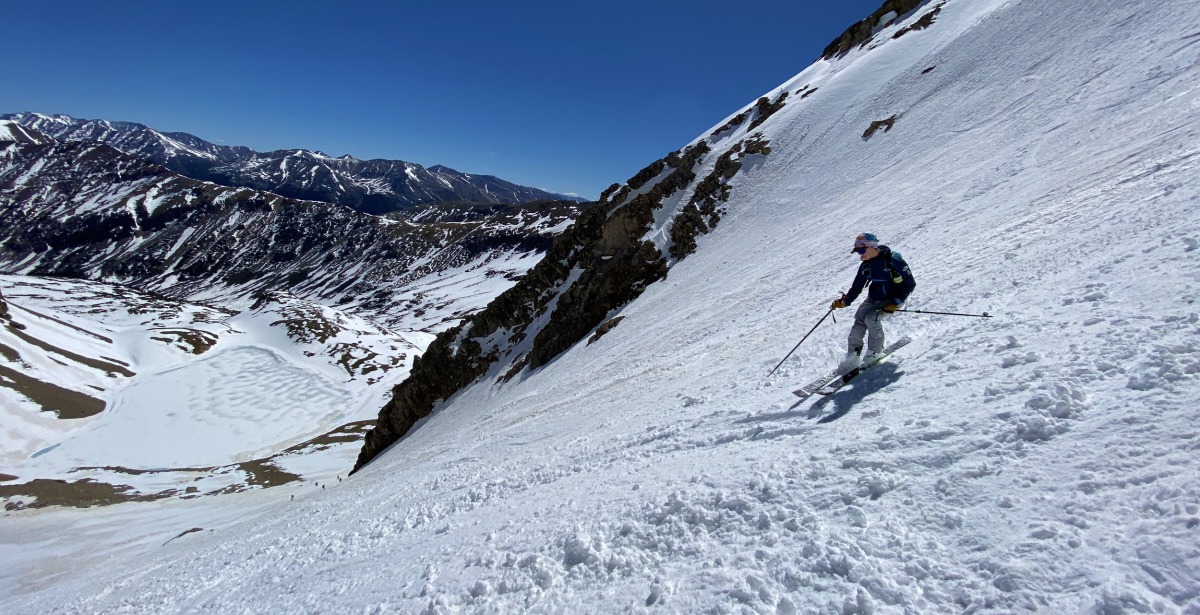
Finding variable but mostly soft snow in the higher stretches of the couloir. Grizzly lake is below. Photo: @hughcarey406
Cold variable snow up high gave way to crusted mushy snow lower down. Finally we hit consistent soft corn in the apron which we rode all the way until the willows in Grizzly Creek outnumbered the snow patches and we were back on dry dirt. Of course, though, the journey wasn’t over yet. We still had a hike and bike ride ahead. The late morning alpine sun was bearing down now but a cool breeze swept up the valley.
On the ride back to the van, I determined a few ideal characteristics of a bike to ski rig: efficient, lightweight, fast and stable. Those apply to both the skis and the bike. The skis had proven their mettle on the ski portion, but how about the bike? Though I did get rattled around a little in the absence of a front shock on the Vault, I was surprised by how I could charge into a rocky line and the bike would hold it. The Iso Flex noticeably dampened the small bumps and the big ones, not quite on the level of rear shock, but also much lighter and minimal. We made quick work of the road descent and in short time, were cheersing Pamplemousse sparkling waters at the van.
In all, the day totaled 4500 feet of climbing (1000 by bike, 3500 by foot and ski) over 20 miles which we completed in a relatively casual 5 hours of moving time. It felt great to have completed the journey as planned, but something else felt surprisingly good also: me. After last year’s unsuccessful attempt, I’d been fully worked over. This year though, I was ready to head out for another ski or, perhaps, a nice summery gravel bike ride.
Manasseh Franklin is a writer, editor and big fan of walking uphill. She has an MFA in creative nonfiction and environment and natural resources from the University of Wyoming and especially enjoys writing about glaciers. Find her other work in Alpinist, Adventure Journal, Rock and Ice, Aspen Sojourner, AFAR, Trail Runner and Western Confluence.

